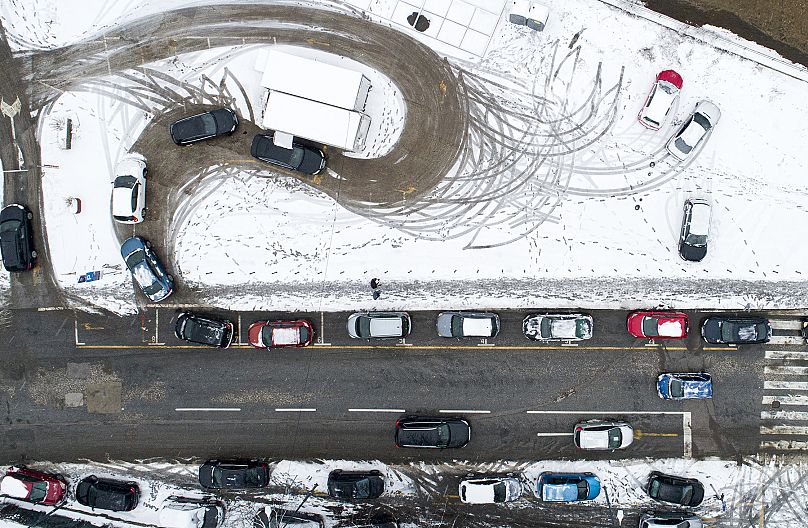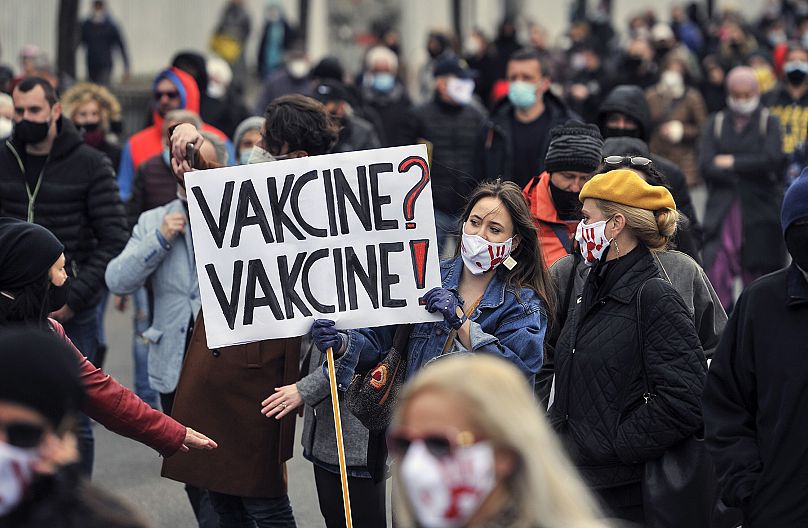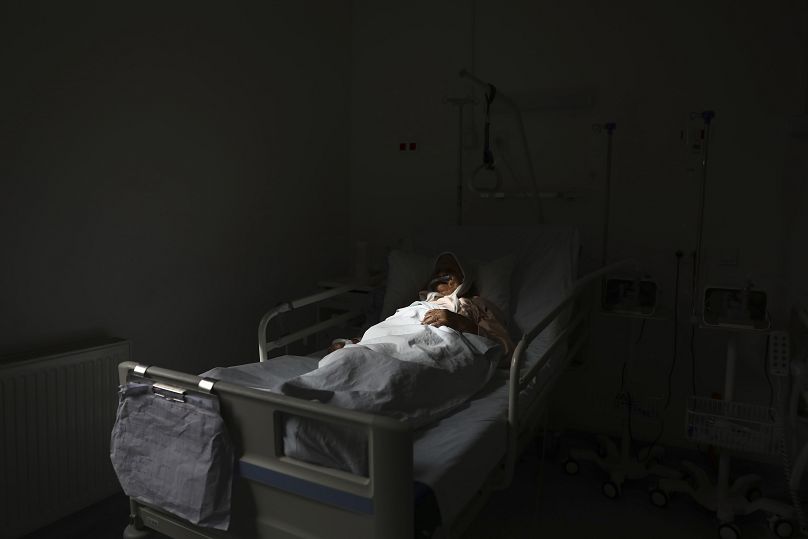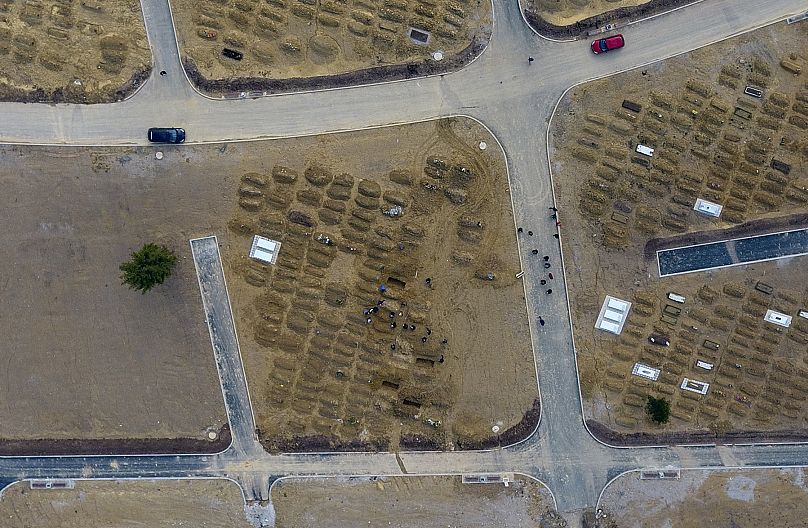As authorities shift blame, the lack of a clear strategy to handle the most recent spike of the Omicron variant has Bosnians unsure of how to act.
Hunkered down in his Sarajevo apartment for the fifth day in a row, Armin Redžić was not sure whether his increasingly worrying symptoms were those of a COVID-19 infection.
 ADVERTISEMENT
ADVERTISEMENT
 ADVERTISEMENT
ADVERTISEMENT
When he started feeling weak, the radio journalist at the National Radio-Television of Bosnia and Herzegovina chose to self-isolate and was instructed to go in for testing.
Wherever he called or went, he was told that they were out of tests. The health system is currently significantly overstretched with tens of thousands of citizens suspected of having caught the highly-contagious Omicron variant.
“I couldn’t wait for the PCR any longer so I just went to the local pharmacy to get an antigen test. They told me that they can’t buy enough to satisfy the current demand.”
He also tried to reach the municipal health clinic. “I called them more than 60 times. Finally I reached a doctor elsewhere who intervened and had my GP call me back,” Redžić told Euronews.
Like many other countries in the Balkans, Bosnian authorities shied away from declaring strict measures around the winter holidays. Celebrations and mass gatherings continued despite the wave that was sweeping the entire continent in December.
The current wave is unprecedented, with cases on average three times higher than the last peak in April 2021. At the time, hospitals were pushed to their maximum capacity and burial services were overwhelmed, leading to week-long waiting lists.
“Everyone is sick now. People can’t get a doctor’s note for a PCR, and the lines at the drive-in testing sites have never been this long. The pharmacist told me she has to do double shifts since all of her colleagues are sick and self-treating at home,” Redžić explains.
Despite being 27-years-old and fully vaccinated, the ordeal of not knowing whether he is positive has led to uneasy thoughts. “What if you’re positive, and it gets more complicated.”
“I’m not angry with the medical staff, to be perfectly clear. Before this wave you could sort this out with one or two calls. I do want to criticise the system that’s not protecting neither us as patients nor the staff,” he explained.
Politics get in the way, again
Two years into the pandemic, Bosnia is second in Europe when it comes to cumulative COVID-related deaths, with 4,255 casualties per one million citizens placing it just behind Bulgaria at 4,688.
At the same time, it is second to last in Europe in vaccination rates with only 22 per cent of its population being fully vaccinated.
Determining the number of daily COVID-19 cases has become a complicated task for health authorities, with the various levels of government opting to switch to rapid testing instead of PCRs, or a combination of the two, due to a lack of resources in some parts of the country.
The main laboratory in Sarajevo has a backlog of unprocessed samples, and the figure of 2,992 positive cases out of 6,025 samples on Wednesday combined several days of PCR results in the reported total.
However, there are concerns among experts that the actual infection rate is much higher, considering the low number of tests conducted overall while hospitals struggle to tend to incoming patients.
The numbers on Friday, with 2,544 tested positive out of 5,556 samples, seem to confirm these concerns.
Bosnia has one of the most complicated political systems in the world, with 14 administrative units operating at various levels with no state-level ministry of health. This caused a nightmare anytime decisions had to be made on country-wide measures or the acquisition of vaccines.
This system is a direct result of the 1995 Dayton Peace Accords meant to stop the war in the country, widely deemed the bloodiest on European soil since World War II.
The peace deal granted the country’s three main ethnic groups — the Bosniaks, the Serbs, and the Croats — full political representation at the cost of inefficient state-level institutions.
The two main administrative units or entities — the Serb-dominated Republika Srpska (RS) and the Bosniak-Croat majority Federation of BiH (FBiH) — each have a health ministry. The FBiH is further divided into 10 cantons, where the cantonal health ministries are in charge of determining how to handle the pandemic.
This created all sorts of initial issues, some more bizarre than others.
A brief security crisis erupted in the spring of 2020 when one of the cantons, Livno or Canton 10, barred citizens of Bosnia who are not registered there from entering in an attempt to stem the spread of the virus.
The decision was swiftly withdrawn after the security minister at the time, Fahrudin Radončić, reacted and likened it to a coup.
At first, it seemed like Bosnia was doing well since the first lockdown measures led to the lowest numbers of cases and deaths in the region. But by the summer of 2020, the country was already mired in scandals related to the questionable purchases of health equipment, including inadequate Chinese-made respirators.
The latter resulted in an ongoing case in front of the state-level court against several highly-placed public servants, including the prime minister of the entity of the FBiH, Fadil Novalić.
The most recent scandal in the entity of RS in September was prompted by an ongoing investigation into claims that hospitals were using industrial-grade oxygen instead of the medical-grade type needed for patients on respirators.
Acquiring vaccines was an even more complicated task, and Bosnia ended up being the last in the region to procure vaccines later in 2021 and mostly through donations.
Producers and distributors complained that negotiations with the various administrative and government levels caused confusion. A state-wide push to purchase was never made, and some suppliers found it impossible to deliver small contingents of 100,000 to individual cantons.
The latest spike and the lack of clear data on how widespread the current infection rate is led to even more confusion in drafting a clear pandemic strategy, says Dr Bakir Nakaš, an infectious disease specialist.
“I truly expected that after all these months and years the situation would be much clearer and that the decisions would be already defined and planned well ahead of time.”
“Unfortunately, I think we haven’t learned any lessons from the mistakes we made from the start and we’re now back to square one,” Nakaš, considered the country’s foremost expert on contagions, told Euronews.
The actual death toll also remains unclear and could be much higher.
Current statistics only take into account those who tested positive prior to their death, and although the laws in Bosnia require a post-mortem to establish an official cause, this is not done in practice.
“We’re still unsure what to treat as a COVID-related death — whether we should count the deaths caused solely by the coronavirus, or also those caused by conditions exacerbated by the infection,” he said.
“So in some cases, you have people with comorbidities where COVID might have only contributed to their lives ending sooner, while you also have seemingly healthy young people who succumbed to the illness.”
The deficiencies of the health system and the disenfranchised role of the state led to each relegating responsibilities to the other to the detriment of the citizens, Nakaš believes.
“There is no communication between them that would point to any kind of unified approach to health in the country,” he said.
“The competencies and responsibilities of each are completely unclear, and then you have the state as the nominal guarantor for the health and safety of its citizens doing absolutely nothing to protect them. On top of that, you have local administrative levels claiming that health is not within their set of responsibilities.”
In March 2021, Nakaš filed a lawsuit against a number of the country’s key decision-makers, including the state-level prime minister Zoran Tegeltija and the FBiH PM Novalić, claiming that their inability to acquire vaccines amounted to gross negligence.
The state-level Prosecutor’s Office stated at the time that an investigation would be launched into the “criminal responsibility for the heavy consequences caused to the lives and the health of Bosnian citizens by the escalation of the coronavirus pandemic”.
Nearly a year on, the office has made no progress in the case.
“It ended with me providing a statement for the Prosecutor’s Office. I feel like it’s been shelved as not being relevant — but it is absolutely relevant because the increase in the death toll in the second part of the pandemic is directly related to the passive approach of the institutions,” he said.
If anything, it has caused further scepticism towards the jab, according to Nakaš.
In September, the entity of the Republika Srpska authorities had to destroy about 55,000 doses of expired AstraZeneca vaccines. Similarly, in November, a portion of the 500,000 AstraZeneca vaccines donated by Austria also had to be disposed of.
“A large part of the population was ready to get vaccinated when other countries were starting to roll them out. But as the various governments failed to get it on time, they simply relaxed and said, ‘if the government is not procuring it, we might not need it after all,’” Nakaš explained.
‘People don't trust anyone’
At the same time, life goes on as usual for many and cafes, restaurants, and nightclubs are full to the brim with customers. New Year celebrations — a popular holiday in the country — as well as a number of religious holidays led to people spending time in groups, despite clear warnings that the pandemic is far from over.
Almir Aljović, a neuroimmunologist completing his doctorate at the University of Munich believes that in a country and a society overburdened with economic and political troubles, the neglect came from a deep-set frustration with the seemingly endless pandemic.
“As people grow more tired of the pandemic — which is something I can relate to — there are more discussions about the freedom of choice. Is it absolute, and should we be allowed to jeopardise the life of another person for our own personal needs, or should there be a balance between personal freedoms and social responsibility?” Aljović told Euronews.
The fact that the country is going through the worst political crisis since 1995 does not help either, he said.
“The existential issues that Bosnian society is currently facing shifted the focus from socially responsible behaviour to the question of ‘why is someone taking my rights away from me’, without even wondering what it might do to those who are in poor health or immunocompromised, or who might have long-term consequences from COVID-19,” he explained.
The lack of trust in the COVID-19 vaccines — which has slowly turned into very vocal scepticism — also reflects a deep disappointment with the institutions in a country that has been mired in political crises since 1995, Aljović believes.
“People simply don’t trust anyone, and now there is a false equivalence between science and politics. We don’t trust politicians who are telling us we should get vaccinated just like scientists are, so we will somehow decide not to trust the scientists either.”
This led to Aljović, who also runs Znanium, a Bosnian-language YouTube science vlog dedicated to the COVID-19, becoming the target of people in the country who oppose vaccines.
With every new episode, he gets thousands of comments and messages from anti-vaxxers and conspiracy theorists which range from insults to threats.
“It’s not easy. I get life-threatening messages just because I talk about science or accusations that I’m a shill. But the conspiracy theorists and anti-science people are so present, especially on Facebook.”
Not everyone in the country is a die-hard anti-vaxxer, but they are a lot more vocal and present in these debates according to Aljović. Overall, the pandemic has led to everyone — including those in power — accepting less and less responsibility for their words and actions.
“The bar for what someone can do or say and not be ostracised for it — starting with the politicians — is very low. Politicians in the country can do practically whatever they please and people won’t hold them responsible,” Aljović said.
Every weekday, Uncovering Europe brings you a European story that goes beyond the headlines. Download the Euronews app to get a daily alert for this and other breaking news notifications. It's available on Apple and Android devices.














